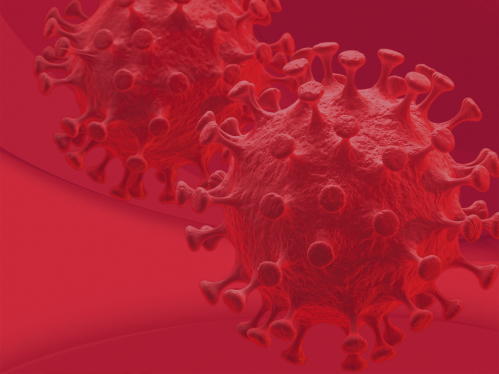Pursuing the Common Good
The work Rutgers does through the excellence of its health systems, scholarly research, and outreach programs profoundly impacts the creation, sharing, and application of knowledge. Our collaborations with local and global partners addresses societal challenges and improves the lives of people in New Jersey and around the world.
By 2050, it is expected that a new case of Alzheimer’s will occur every 33 seconds. This grim prognosis drives Rutgers scientists and clinicians to find ways to prevent and stop the progression of this devastating disease.
Watch our video to see the important work being done at Rutgers to tackle this health crisis.
Closing the Gap on Alzheimer's
Using a unique approach to studying human brain cells, Rutgers scientists are tirelessly working to advance the understanding of how destructive proteins linked to Alzheimer’s disease attack cells and destroy surrounding brain tissue. The research has identified a potential therapeutic target for this disease that afflicts millions and has no known cure.
In its continuing efforts to advance research into the underlying causes of and identify treatments for Alzheimer’s disease and dementia, Rutgers will launch the Herbert and Jacqueline Krieger Klein Alzheimer’s and Dementia Clinical Research and Treatment Center in fall 2023.
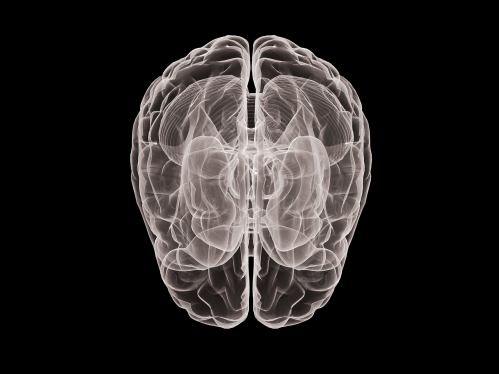
Getting ahead of an Alzheimer’s Diagnosis
The Rutgers Aging & Brain Health Alliance is focused on preventing Alzheimer’s before diagnosis. The discovery of a gene that indicates the predisposition to Alzheimer’s, ABC. A780, which is exclusive to African Americans has led to outreach, education, and prevention efforts working with the African American community in the city of Newark, New Jersey, where the Alliance is based. Lifestyle changes such as diet, exercise, and active mental engagement are shown to reduce the manifestation rate of the disease and are at the core of the approach that the Alliance is studying to support the prevention of Alzheimer’s.
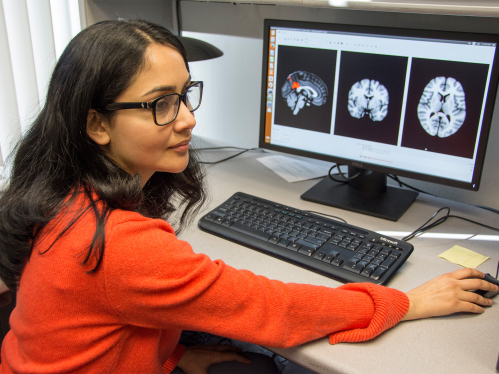
Building the Future, One City at a Time
Our WINLAB is taking tomorrow’s tech out of the lab and into the streets of New York City
Building on their extensive research with wireless testbeds, radio technology, and mobile internet architecture, the Rutgers team at the Wireless Information Network Laboratory (WINLAB) is helping to implement COSMOS, a real-world outdoor lab putting next-generation wireless technology to work.
A major partnership between Rutgers, Columbia, NYU, CCNY, and other innovation leaders, with funding from the National Science Foundation, COSMOS will be deployed across a square mile in Manhattan’s vibrant, densely populated West Harlem neighborhood. These urban wireless networks of the future will support data-intensive applications for a smarter, safer world, including:
- Smart intersections that can safely process vital information in real time
- Cloud-based autonomous vehicles for reliable driverless transportation
- Remote surgery enabling doctors to operate on patients across great distances
- Augmented and virtual reality to enhance interactivity and provide new experiences
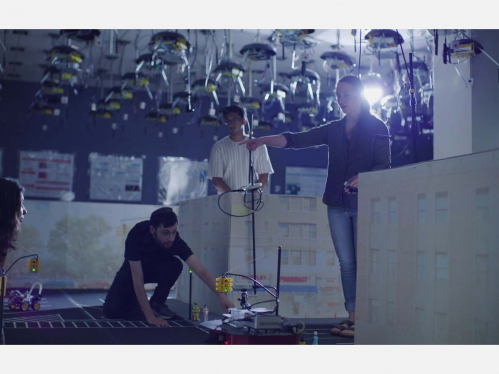
Giving Students Access to Excellent Education
Rutgers makes a world-class education accessible and affordable. All eligible New Jersey students can attend Rutgers tuition-free for four years through a combination of university, federal and state financial aid programs.
Our R-UN to the Top, Bridging the Gap, and Scarlet Guarantee programs build on existing state and federal aid programs to enable in-state students with family incomes below $65,000 to attend the university tuition-free and to reduce tuition and fees for students with family incomes below $100,000.
- $90M+ in federal Pell Grants to more than 17,700 Rutgers students, 2020–2021
- 9,000 students received nearly $30 million in financial aid and emergency assistance through Scarlet Promise Grants
- 75% of Rutgers students receive financial aid
- 34% of 1st-year students are first-generation undergraduates
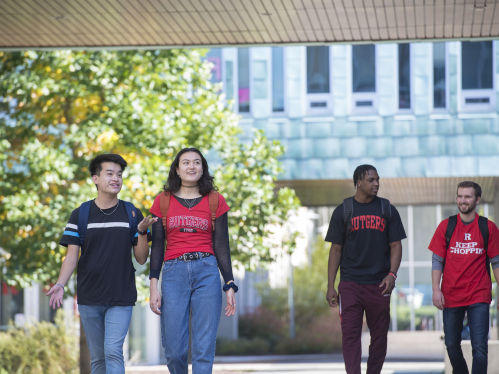
Creating Upward Social Mobility through Pell Grants
U.S. News & World Report
U.S. News & World Report
U.S. News & World Report
Committed to Research Excellence
Our researchers transform lives, improve communities, and advance society.
FY 22
FY 22
FY 22
Researching America’s Gun Violence Epidemic
Rutgers leads one of the nation’s first state-funded centers researching gun violence, a complex issue deeply rooted in American culture.
Rutgers’ New Jersey Gun Violence Research Center translates its research into actionable policies and programs to reduce gun violence, while respecting the right to legal, safe gun ownership and use.
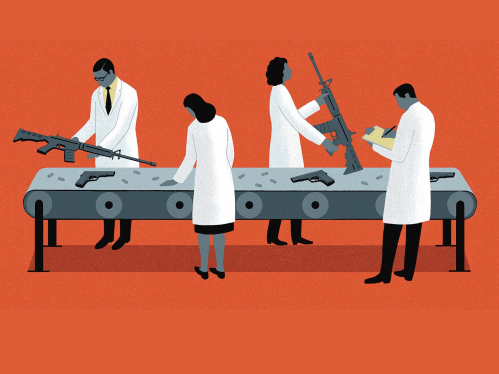
R&D with an Impact
Rutgers creates a better world for us all through research and development driven by a relentless pursuit of excellence. Rutgers exceeds all NJ colleges and universities combined in R&D expenditures.
FY 20
Reuters
FY 22
A Leader in Health Care
Rutgers Biomedical and Health Sciences conducts research, trains health professionals, and provides patient care through our Rutgers Health practice, New Jersey's sole academic health care provider organization.
Meet Our Health Champions
Rutgers has brought together some of the finest minds in health care to confront humanity’s most urgent challenges. These researchers are leading discoveries across the spectrum of human health, from genomic psychiatry to infertility and so much more, with results that will save lives.
Samantha Bell, Ph.D.
Tuberculosis
In order to develop more effective therapies for tuberculosis, Samantha Bell is studying the bacterium that causes the deadly disease and how the immune system detects this pathogen. Her research seeks to unravel the mysteries of the pathogen/immune system interplay--colloquially referred to as “the arms race”--and how bacterial and human factors dictate disease outcomes. The resources available at Rutgers have proven invaluable; notably collaborations with leading experts in the field, a diverse and enthusiastic community of colleagues from around the world; in addition to cutting-edge lab facilities. Rutgers has also proven uniquely supportive, especially to early career faculty.
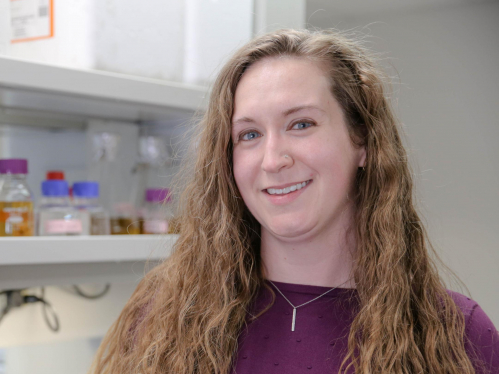
Martin Blaser, M.D.
Human Microbiome
Martin Blaser chose Rutgers as the ideal destination where he could take his acclaimed research to new heights. His work over the past 30 years has led to a new understanding of the beneficial relationships between humans and their microbiome–the microbes that live on and in our bodies–impacting health and diseases including asthma, obesity, diabetes, and cancer. Author of Missing Microbes, a general audience book translated into 20 languages, he’s written over 600 articles and holds 28 U.S. patents. The recipient of the Robert Koch Gold Medal and the Alexander Fleming Award for his accomplishments, Blaser is also advisor to students, post-doctoral fellows, and junior faculty. He currently serves as Chair of the Presidential Advisory Council for Combating Antibiotic Resistant Bacteria and is a member of the National Academy of Medicine and the American Academy of Arts and Sciences.
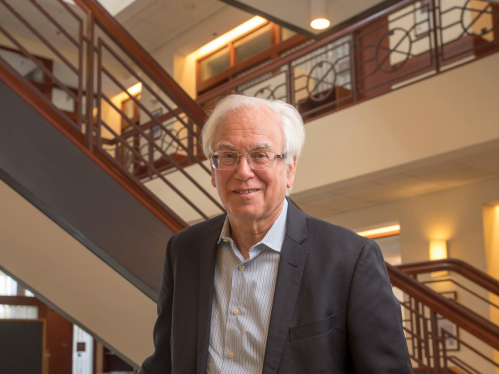
Nataki Douglas, M.D., Ph.D.
Reproductive Endocrinology and Infertility
Board Certified Reproductive Endocrinologist Nataki Douglas combines patient care with translational research to raise the clinical bar for her patients. Her research is focused on the role of the endometrium (uterine lining) as a determinant of embryo implantation and normal formation of the placenta, both of which are needed for a successful pregnancy. This work addresses important unanswered questions in the field of gynecology and will deepen our understanding of endometrial regeneration. Douglas chose Rutgers for the opportunity to provide clinical care to a diverse population and for the many exciting opportunities for scientific collaboration and professional growth, with leadership committed to diversity, equity, and inclusion for all faculty, staff, and students.
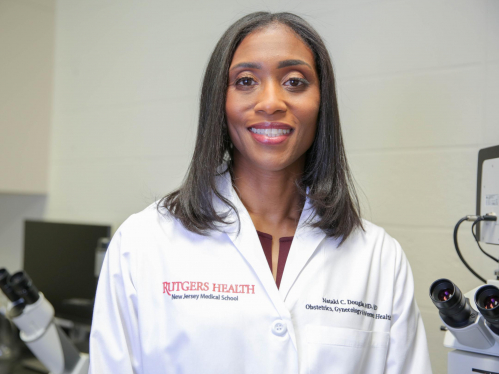
Pingping Hou, Ph.D.
Cell Therapy for Pancreatic Cancer
Hou’s research focuses on the oncogene KRAS and the development of cell therapy in pancreatic cancer, addressing low five-year survival rates of patients with advanced stages of the disease. Hou was drawn to Rutgers’ strong biomedical research programs, NIH-designated comprehensive cancer center, and core facilities that can further cancer research, in addition to dedicated programs to help junior faculties with their career development. She welcomes the chance to contribute to what she has found to be an open, equal, inclusive, diverse, and collaborative academic environment.
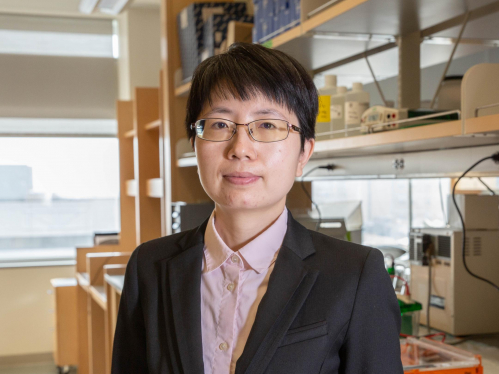
Rey Panettieri, M.D.
Translational Science and Medicine
Reynold Panettieri and his team are pioneering new ways to improve the care of asthma and COPD patients, using new drugs to open the narrowed airways of the lung. As a physician scientist, he’s particularly excited to put their new discoveries into practice, and is working toward a future when patients can be cured before they even become ill. He sees Rutgers’ potential to grow meteorically, uniquely empowered to improve health state-wide, employing state-of-the-art scientific approaches and leveraging incomparable expertise across all the biomedical schools.
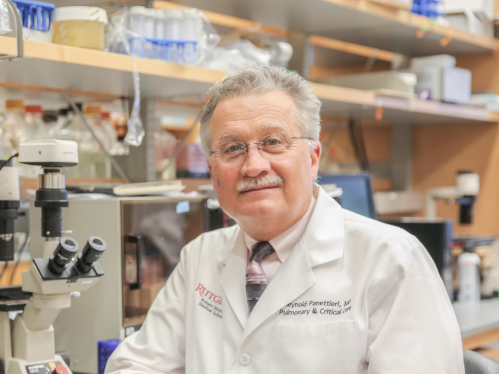
Carlos Pato, M.D., Ph.D.
Genomic Psychiatry
Carlos Pato is studying how genetics affects serious mental illness, working with large, diverse populations to define the genetic profiles that cause risk and those that are protective against these devastating disorders. Access to the latest technologies has greatly advanced Pato’s research and is enabling him to make a real difference in people’s lives, developing appropriate treatments that in turn lead to better health outcomes. Rutgers helps make this possible through continued investment in discovery and education, as well as an unwavering commitment to the care of hundreds of thousands of patients in New Jersey.
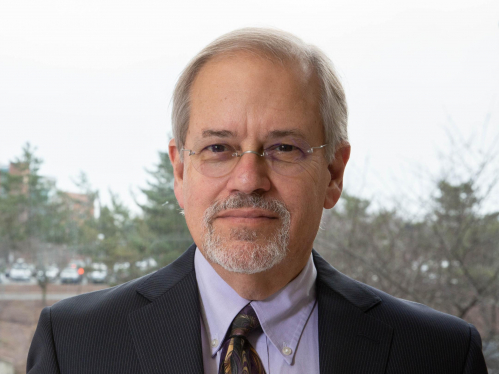






A Global Leader in COVID-19 Research
- First saliva diagnostic test for COVID-19
- Verified effectiveness of first rapid point-of-care diagnostic test
- Developing breathalyzer test for fast COVID-19 results
- Clinical trial site for Pfizer vaccine in children under 12
- Clinical trial site for Johnson & Johnson vaccine
- Clinical trial site for Moderna vaccine
- One of the nation’s largest studies of workers exposed to COVID-19, used for clinical trials
- $5 million NIH grant to expand COVID-19 testing for New Jersey’s underserved
And our work continues. At the Center for COVID-19 Response and Pandemic Preparedness, our scientists are accelerating the discovery of new diagnostics, therapeutics, and vaccines for coronavirus and preparing now to respond to future epidemics.
